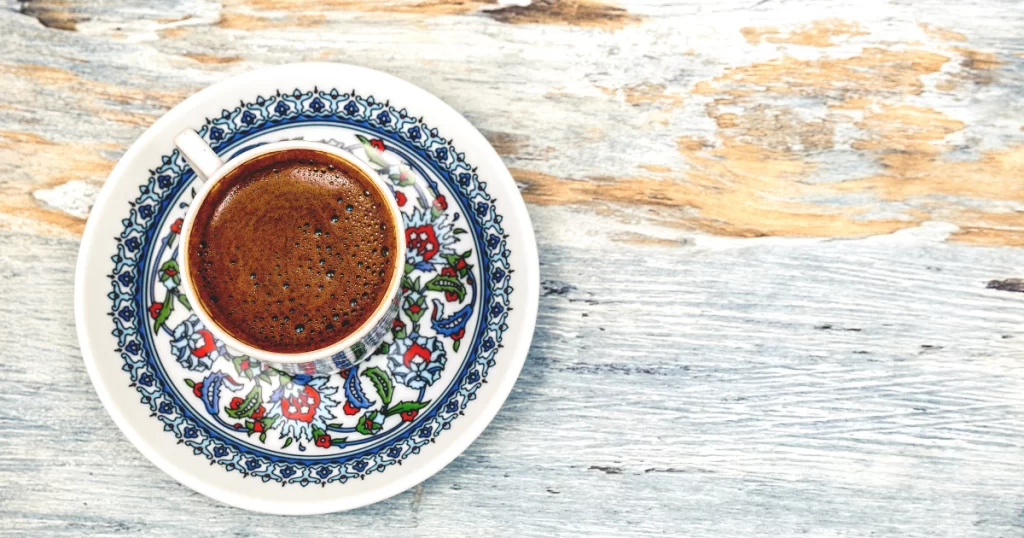A lot of myths surround Turkish coffee’s caffeine levels and its reputation as a strong and intense coffee. The purpose of this blog post is to separate fact from fiction about Turkish coffee caffeine.
💡 Never prepared Turkish-style coffee? Check out a simple traditional Turkish coffee recipe.
Does Turkish coffee have caffeine?
Just like any other kind of coffee, it is packed with caffeine.
Turkish coffee has around 25 mg of caffeine for each oz of liquid, according to Caffeine Informer.
Can caffeine in Turkish coffee be bad for you?
No, but it depends on how much coffee you drink every day. When consumed in moderation, caffeine is generally safe for most people, but excessive consumption can negatively affect some people.
Here you can read more about situations when this Turkish beverage can be bad for you.
Can caffeine help you with weight loss?
If you are looking for an ally in your weight loss journey, then caffeine and coffee are a great choice. Here you will see what kind of type of Turkish coffee is the best if you are looking to slim down.
It is important to keep your coffee consumption in moderation. Even if it can help in some cases, it isn’t a magic potion that will do all the work for you.
Turkish coffee and popular diets
For all Turkish coffee lovers, the good news is that you can still enjoy it even if you are on some of the most popular diets.
For example, if you are on a Keto diet or intermittent fasting, this type of coffee can be your best friend, but only if you drink it as a regular black.

Is Turkish coffee high in caffeine?
This Turkish drink may not be as high in caffeine as you might think, especially when compared to espresso. While both coffees are known for their concentrated flavors, the brewing methods differ significantly.
The process of making espresso involves forcing hot water through finely-ground coffee under high pressure. The lack of pressure in the Turkish brewing process means that the extraction efficiency is lower compared to espresso. However, it has more caffeine than regular coffee.
If you would like to discover other differences between espresso and Turkish coffee, read this article.
How many cups of Turkish coffee per day?
With its strong flavor and caffeine content, it can provide a delightful energy boost. However, listen to your body and be mindful of your caffeine intake.
Adults should keep their caffeine intake below 400 milligrams a day, equivalent to four to five cups of coffee.

How caffeine is extracted in Turkish Coffee
In this coffee preparation, finely ground coffee beans are simmered in water, allowing for a slow and gentle extraction of flavors, including caffeine.
As the coffee grounds are simmered, the water gradually absorbs the flavors and compounds present in the beans, including caffeine.
The slow extraction process in Turkish coffee can take some time, typically around 4-6 minutes. This unique brewing process results in distinctive taste and intensity.
Is there a decaffeinated Turkish coffee?
Yes. For those who love the taste and ritual of Turkish coffee but want to reduce their caffeine intake, they always have a decaffeinated option.
At the moment, there aren’t a lot of options available, but if you dig deeper, you’ll find a brand that you enjoy.
5 myths and misconceptions about Turkish coffee
Turkish coffee has a rich history and cultural significance, but it also comes with its fair share of myths and misconceptions. Let’s debunk some of the most common ones:
Myth 1: Turkish coffee has the highest caffeine content.
Fact: While Turkish coffee is known for its strong flavor, it doesn’t necessarily mean it has the highest caffeine content. Brewing methods like espresso often yield higher caffeine levels due to the extraction process.
Myth 2: Turkish coffee can sober you up after drinking alcohol.
Fact: There is a popular belief that Turkish coffee can help counter the effects of alcohol. However, coffee cannot sober you up. It may make you feel more alert, but it does not eliminate alcohol from your system or reduce its effects.
Myth 3: Turkish coffee is only served sweet.
Fact: While it’s true that traditional Turkish coffee is often prepared with sugar, it is not the only way to enjoy it. You can customize your Turkish coffee to suit your taste preferences.
Myth 4: Turkish coffee is difficult to make at home.
Fact: All you need is finely ground coffee, water, a cezve (small coffee pot), and a heat source.
Myth 5: Turkish coffee is the same as Arabic coffee.
Fact: While Turkish and Arabic coffees share some similarities, they are not exactly the same. Each has its own distinct characteristics, brewing methods, and cultural significance.
In conclusion
Turkish coffee is a delightful and potent brew that can ignite your senses and enhance your daily routine.
Rich in caffeine, it is no surprise that this unique coffee is loved for its energizing qualities. However, it is crucial to remember that moderation is key – excessive consumption can lead to a range of problems.
My journey through renowned bars and coffee shops over five years, as a barista, coffee aficionado, and former bartender, has honed my pursuit for the perfect cup. My passion for coffee isn’t just about the brew—it’s about sharing the knowledge and insights I’ve gleaned along the way.



